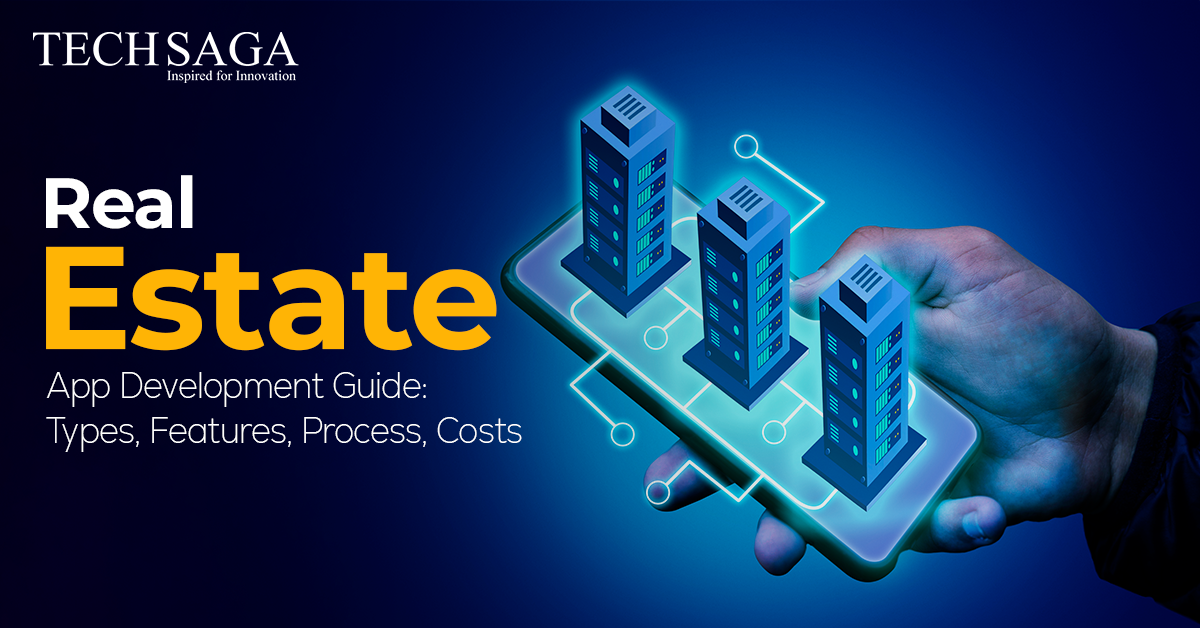Team Techsaga
Gain valuable insights and stay updated with the latest innovations through our engaging blog. Explore trends, technology advancements, and expert opinions to navigate the ever-evolving world of IT.
Real Estate App Development Process, Features, and Cost Analysis
Imagine browsing through potential homes, scheduling viewings, and even closing deals all from the palm of your hand. This is the future of real estate, brought to life through innovative real estate apps. As the real estate market becomes increasingly competitive, having a robust, user-friendly app can set your business apart, making it easier for clients to find their dream properties and for agents to manage listings efficiently. Whether you’re an ambitious startup or an established firm, understanding the Complete real estate app development is essential for success in this digital age.
Here is the detailed information on this. Let’s get started.
Real Estate App Explained:
A real estate app is a mobile application designed specifically for the real estate industry, facilitating various functions such as property search, listing management, and client-agent communication. These apps allow users to browse properties based on specific criteria like location, price range, and amenities, often featuring high-quality images, virtual tours, and interactive maps for enhanced user experience.
Moreover, they streamline the buying, selling, and renting processes by providing real-time updates, notifications on new listings, and secure payment gateways. Real estate apps cater to both consumers looking for properties and agents seeking efficient tools to manage listings and interact with clients effectively.
Features of Real Estate App:
User Authentication-
User Authentication ensures secure login and registration for buyers, sellers, and agents in real estate apps. It includes robust mechanisms such as email verification, password encryption, and possibly two-factor authentication to safeguard user accounts and personal information from unauthorized access.
Adding User Profiles-
Implementing user profiles in real estate apps allows personalized experiences, enabling users to save preferences, view search history, and manage notifications. This feature enhances engagement and facilitates efficient interaction between buyers, sellers, and agents.
Property Listings-
Property Listings in real estate apps feature detailed descriptions, high-quality images, videos, and virtual tours. Users can filter listings by location, price, size, amenities, and more, providing comprehensive information to facilitate informed property decisions.
Interactive Map Integration-
Real estate apps feature advanced search capabilities with filters and integrated maps like Google Maps or Mapbox. Users can conduct location-based property searches efficiently, narrowing results based on criteria such as price range, property type, and amenities. Map integration provides visual context, allowing users to view properties geographically and assess proximity to essential locations and services.
Real-Time Notifications-
Such apps offer real-time notifications, alerting users to new listings, price adjustments, upcoming open houses, and messages from agents. This feature keeps users informed of relevant updates, ensuring timely responses and enhanced engagement with potential property opportunities and agent communications.
Mortgage Calculator-
A mortgage calculator in real estate apps allows users to estimate mortgage payments based on property price, interest rate, and down payment. This tool aids in financial planning by providing insights into monthly repayment amounts, helping users assess affordability and make informed decisions when considering property purchases.
In-app chat and Messaging-
Real estate apps facilitate seamless communication among buyers, sellers, and agents through in-app messaging and chatbot integration. This feature enables instant messaging for inquiries, negotiations, and updates, enhancing efficiency in property transactions. Chatbots provide automated responses and assistance, ensuring constant availability and improving overall user experience in real-time interactions.
CRM Integration-
Real estate apps integrate seamlessly with Customer Relationship Management (CRM) systems, empowering agents to effectively manage leads and client interactions. This integration streamlines data capture, lead nurturing, and follow-up processes. Moreover, ensuring agents can track client preferences, schedule appointments, and optimize communication to foster stronger relationships and drive successful property transactions.
Virtual Tours-
Incorporating Virtual Reality (VR) and Augmented Reality (AR) features offer virtual property tours and visualization experiences. VR allows users to immerse themselves in realistic 3D property tours from anywhere, while AR overlays virtual elements onto real-world environments, enabling potential buyers to visualize furniture placement or renovations. Therefore, these technologies enhance property exploration and decision-making processes, offering a compelling and interactive user experience.
Analytics and Insights-
Real estate apps utilize data analytics to monitor user behavior, track popular listings, and identify market trends. This data-driven approach enables app owners to understand user preferences, optimize user experience, and tailor marketing strategies. By analyzing metrics such as search patterns, listing views, and user interactions, real-time insights empower stakeholders to make informed decisions, enhance app performance, and capitalize on emerging market opportunities effectively.
The Complete Real Estate App Development Process:
Here is the step-by-step process that real estate app development company India follows:-
Research and Planning-
It is essential to comprehend the target market, industry trends, and rivals. Define the app’s goals, features, and technical requirements to ensure it meets user expectations, addresses market demands, and competes effectively in the industry.
Design-
It is important to design with user interfaces (UI) and user experiences (UX) in mind. The application need to be simple to use, aesthetically pleasing, and intuitive. Designing mockups and prototypes helps visualize the app’s aesthetics and functionality. Therefore, ensuring a seamless and engaging user interaction.
Development-
This stage involves actual coding and programming. Backend development (server, database) and frontend development (client-side interface) are carried out by developers proficient in relevant technologies (e.g., Swift for iOS, Java/Kotlin for Android).
Testing-
Rigorous testing ensures the app operates smoothly across diverse devices and scenarios. It encompasses functional, usability, performance, and security testing to validate its reliability, usability, efficiency, and protection against vulnerabilities.
Deployment-
Once tested and refined, the app is prepared for deployment on app stores such as Apple App Store and Google Play Store. Following the policies and rules of the app store is crucial to a successful launch for the intended market.
Maintenance and Updates-
Post-launch, continuous maintenance is essential to address bugs, implement feature updates, and maintain compatibility with new operating system versions and devices. This ongoing effort ensures the app remains functional, secure, and optimized for an optimal user experience over time.
Cost Analysis of Real Estate App Development:
Factors Influencing the Cost-
Factors influencing the real estate app development cost:
- Complexity of Features: More complex features require more development time and resources.
- Design Requirements: Costs may go up for personalised animations and designs.
- Development Team: Hiring experienced developers and designers can be costly but ensures quality.
- Technology Stack: The choice of technology (native vs. hybrid) impacts the cost.
- Maintenance and Support: Costs are increased overall by ongoing support and maintenance.
Conclusion:
Developing a real estate app is a significant investment that can yield substantial returns by enhancing user experience and streamlining operations. Through comprehension of the real estate app creation procedure, integration of crucial functionalities, and comprehensive expense evaluation, enterprises may generate a competitive and effective application. Embracing technology in real estate is no longer optional but a necessity to stay ahead in a digital-first world.
Techsaga Corporation specializes in real estate app development services. We provide tailored solutions for real estate agents, property developers, and investors, focusing on creating intuitive and feature-rich applications. Our services include custom app development, CRM integration, VR/AR functionalities, and ongoing maintenance and support to ensure optimal performance and user satisfaction in the competitive real estate market.




